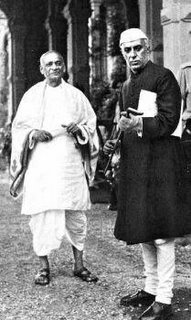
On May 9, 1947 Brigadier Cariappa (he was yet to become a General) suggested at a private meeting that once the British had left there should be a military dictatorship. The force, ‘with either Nehru or Jinnah as Commander-in-Chief should take over power’. Mountbatten replied that such a course of action would be ‘not only wholly impractical but highly dangerous’.
From-‘Divide and Quit’ by Penderel Moon, London 1961 page 755As you might have observed it were two men with army background talking about a possible solution to India’s problem.
What purpose would have been served if India had taken control of the whole of Kashmir in Military action (which sorry to break your heart would have been impossibility then and is even now unless we want to create our own Afghanistan?), we still would have had to deal with the Kashmir problem. The problem in Kashmir was of political nature and Nehru was trying to find a political solution when he agreed to the pleblicite.
Kashmir is today part of India thanks to Nehru and Patel both.Nehru’s personal feelings were an important determinant in the state’s future. Mountbatten regarded Kashmir as the ‘one subject on which he could not get Nehru to see sense ’. The retiring Commander-in-Chief of Pakistan, General Sir Frank Messervy, commented after a private conversation with Nehru in February 1948: ‘he said that he quite appreciates my arguments [in favor of Kashmir joining Pakistan] but
-Letter from Frank Messervy to Roy Bucher, 4 March 1969.“As Calais was written on Queen Mary’s heart, so Kashmir is written on mine.”In other words, sentiments overcame reason on this particular issue. What a tragedy.’
Although Nehru’s role in the military takeover of Kashmir was, as might be expected, more propitiatory than that of Patel, the fact that Nehru remained as India’s Prime Minister into the 1960s made the chance of any subsequent concession unlikely.
On 26 October, V.P. Menon supposedly flew to Jammu and persuaded the Maharajah to sign an instrument of accession to the Indian union, enabling the Indian army to formally intervene and oust ‘raiders’. According to one Indian army officer who was present at a meeting of the defense committee in New Delhi later that day, Nehru still had doubts about intervention, and ‘talked about the united nations, Russia, Africa, god almighty, everybody, until Sardar Patel lot temper. He said
“Jawaharlal, do you want Kashmir, or do you want to give it away.” Nehru said. “Of course I want Kashmir”…and before he could say anything Sardar Patel turned to me and said, “You have got your order.”’
Interview with Sam Manekshaw in “Kashmir, 1947: Rival Versions of History” by Prem Shankar Jha p.135, New Delhi 1996.

Comments
Post a Comment
I always like to hear back :)
However, irrelevant comments and irrelevant links will not be published. Needless to say, same goes for abusive comment and spam. Leaving back links related to the topic is encouraged. I know it can be tempting but try not to leave your email ids, phone nos and CVs in the comment.